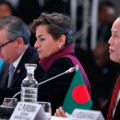Ministers Take Over Climate Talks
Anna Heyward | December 7, 2015.
It’s the first day of week two at the climate change conference in Paris. We’re nearing the finish line, with a final agreement due Friday the 11 December. The week opened with what the conference calls the ‘High-Level Segment,’ in which ministers and negotiators are invited to deliver their version of the state of affairs in the form of a three-minute statement. At this point, each party is finding a way either to protect, or insert their interests into the draft agreement, and public expressions such as these can be taken as indicators of what they’ll be fighting for behind closed doors–and the flow of money from rich countries to poor countries remains the strong undercurrent of the political speech.
Conference leaders used their opening remarks to affirm the possibility of a successful outcome by Friday, with rhetoric of urgency. President of the conference, French foreign minister Laurent Fabius, welcomed all parties to the “week of hope.”
Fabius argued that the remaining decisions for the Paris meeting are “immense and existential.”
“At stake here is life itself.” – Laurent Fabius, French Foreign Minister.
UN Secretary General Ban Ki-moon said that even the goal of 1.5°C would have “grave consequences,” and also saluted the group of mayors who came to Paris and spoke of a conversation with a young girl from the Pacific islands who asked him: “What will happen to us?”
Christiana Figueres, executive secretary of the climate change convention, addressed the newly-arrived ministers.
“It is up to your political stewardship to ensure the agreement… It is up to you to deliver an agreement that safeguards the most vulnerable.” – Christiana Figueres, UNFCCC Executive Secretary.
The concepts of differentiation and finance remain the priority of countries from the global South. The Prime Minister of Tuvalu – one of the nations most vulnerable to rising sea levels, and be likely to produce the first climate refugees – was existential in his speech. “We have no time for rhetoric or hiding behind agendas,” said Enele Sopoanga. At current warming, Sopoanga said, “Tuvalu’s future is very bleak… Anything above 1.5°C will spell our demise.” He also emphasised the need for “a permanent provision for loss and damage,” and for financing to be determined in favour of the most vulnerable nations.
“There is a big wave in the pacific, and that is fear.” – Enele Sopoanga, Tuvaluan Prime Minister.
Taking a similar position, the minister from Swaziland, Barnabas Dlamini, expressed concern that the sum of each country’s pledges for emissions reductions, or INDCs, are insufficient to keep the global average temperature rise below 2°C, implying further concessions will be necessary in the coming days. Dlamini qualified this statement, arguing: “Our commitment to reduce poverty demands a balanced approach.”
From Egypt, Minister of Environment Khaled Fahmy, speaking on behalf of the African Group of Nations, was firm in his emphasis on differentiation, adaptation, mitigation, and finance for poor and vulnerable states. Fahmy argued Africa is the lowest contributor continent and “can not be expected to divert [its] resources away from development,” arguing for “special arrangements for finance” for African nations.
As expected, Fahmy also stressed the unity of the Africa Group, saying that “new arrangement should not threaten African rights,” and that it is “unacceptable that we give attention to mitigation without paying attention to other goals, such as loss and damage…The burden of ambition reduction should not be shifted to developing countries.”
Angolan minister Maria de Fátima Jardim had a similar message, speaking on behalf of the group known as the Least Developed Countries, repeating that “any Paris agreement will only be valid with special condition for loss and damage,” and estimated adaptation costs at US$5 billion for the LDCs alone. Representing the G77+China group, South African ambassador Nozipho Mxakato-Diseko argued that “historical responsibility for emissions must be accepted by developed countries,” for there to be any real progress.
Several parties also spoke of the impact climate change has already had on their home countries. The minister of Swaziland referred to “the driest ever rainy season.” Deputy Tongan Prime Minister, Mr. Siaosi Sovaleni, spoke of sea levels rising 6.4mm per year in his region, or three times the global average. From Ecuador, Daniel Pacheco, cited record rainfalls and unstable, weather-driven migration in South America, saying that “periods of extreme events are becoming narrower.”
Rich countries spoke of technology as a solution, rather than specific goals to be achieved. Julie Bishop, Australia’s foreign minister, presented a list of Australia’s credentials in disaster relief, avoiding any details around prevention goals, saying that “it will be innovation and technology breakthroughs that will be the solution,” along with “investment from the private sector.” Avi Gabbay, Israel’s minister of environmental protection said that although Israeli emissions are “nothing to write home about,” their focus will be in “adapting disruptive technology.”
“It will be innovation and technology breakthroughs that will be the solution.” – Julie Bishop, Australian Foreign Minister.
Saudi Arabia, the last country to submit an INDC and one of the most resistant to the 1.5°C goal, sent their minister of petroleum and mineral resources Ali Al-Naimi, who spoke of a “balance between emissions and adaptation,” and the idea of “not being discriminatory against energy sources.” Al-Naimi also argued for the need to “take into account negative impacts of adaptation”— making Saudi Arabia the only country to raise concern about climate action, rather than inaction. Al-Naimi also argued for the need to “balance progress with economics.”
Finally, the Austrian minister announced a pledge of “at least half a million euros” to emissions reductions, and then took the unconventional measure of inviting former California Governor Arnold Schwarzenegger onto the stage, who said his dedication to the environment is the result of his idyllic Austrian bucolic upbringing, “swimming in lakes, drinking from streams, playing the forests.”
As the High Level Segment continues until tomorrow night, the remaining parties will give their public statements, considered to be the outward expressions of what each will be lobbying for in closed meetings over the next 72 hours.













comment